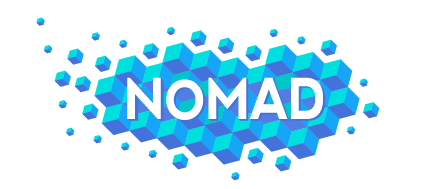On-line course on Big Data and Artificial Intelligence in Materials Sciences
In the winter term 2020/21, we offer an on-line course, which includes extensive hands-on sessions, on "Big Data and Artificial Intelligence in Materials Sciences", aimed at the students of Max Planck Graduate Center for Quantum Materials.
The course covers all the hottest topics in artificial intelligence, including machine and deep learning, compressed sensing, and data mining. General and specific AI concepts are introduced, always with a focus on Materials Science applications, in particular the design and discovery of improved, new, and novel materials for contemporary and future technological advances.
The course is designed to have a strong interactive character. Besides weekly lectures, also by international guest lecturers, it includes four extended hands-on exercises, based on the infrastructure of the NOMAD Laboratory, thus enabling the participants for a smooth transition from learning the basic principles to apply them to analyze the largest database of high-quality Materials-Science data.
To participate in the on-line course Big Data and Artificial Intelligence in Materials Sciences a registration is required. Please see below
Program:
Lectures (11:15 am CET)
|
|||
| 1 | November 5, 2020 | General Introduction to big-data-driven materials science |
(Fritz-Haber-Institut der MPG, Berlin & Humboldt-Universität zu Berlin) |
| 2 | November 12, 2020 | NOMAD Repository, Archive, Encyclopedia |
(Humboldt-Universität zu Berlin & Fritz-Haber-Institut der MPG, Berlin) |
| 3 | November 19, 2020 | Introduction to artificial intelligence and machine-learning methods |
(Fritz-Haber-Institut der MPG, Berlin) |
| 4 | November 26, 2020 |
(Fritz-Haber-Institut der MPG, Berlin) |
|
| 5 | December 3, 2020 | Decision trees and random forests | (Humboldt-Universität zu Berlin & Fritz-Haber-Institut der MPG, Berlin & Google Germany GmbH) |
| 6 | December 10, 2020 | Regularized Regression and kernel methods |
(Humboldt-Universität zu Berlin) |
| 7 | December 17, 2020 |
(Fritz-Haber-Institut der MPG, Berlin) |
|
| 8 | January 7, 2021 | Artificial Neural Networks and Deep Learning part 1 |
Angelo Ziletti (Bayer AG) |
| 9 | January 14, 2021 | Artificial Neural Networks and Deep Learning part 2 |
Angelo Ziletti (Bayer AG)
|
| 10 | January 21, 2021 | Materials data, 4V, FAIR principles |
(Humboldt-Universität zu Berlin & Fritz-Haber-Institut der MPG, Berlin) |
| 11 | January 28, 2021 | Subgroup discovery, rare-phenomena challenge, and domain of applicability |
(Fritz-Haber-Institut der MPG, Berlin & Humboldt-Universität zu Berlin) |
| 12 | February 4, 2021 | Interpretability and Causality |
(CISPA Helmholtz Center for Information Security & Max Planck Institute for Informatics, Saarbrücken) |
| 13 |
February 11, 2021 Exceptionally: 3 pm |
Applications in real materials |
(Georgia Institute of Technology, Atlanta) |
| 14 | February 18, 2021 | AI in experiment |
(Humboldt-Universität zu Berlin) |
| 15 | February 25, 2021 | Fusion of experimental and computational data by AI |
(Fritz-Haber-Institut der MPG, Berlin) |
Hands-on exercises (3:00 pm CET)
|
|||
| 1 | November 12, 2020 | NOMAD Repository and Archive |
(Humboldt-Universität zu Berlin) |
| 2 | November 26, 2020 |
Lauri Himanen (Aalto University) |
|
| 3 | December 10, 2020 | NOMAD Artificial Intelligence Toolkit I: symbolic regression (SISSO), decision trees and random forests, kernelized regression |
(Fritz-Haber-Institut der MPG, Berlin) |
| 4 | January 7, 2021 | NOMAD Artificial Intelligence Toolkit II: data analytics on NOMAD-Archive data, unsupervised learning, neural networks, and more. |
(Fritz-Haber-Institut der MPG, Berlin) |
Registration
Students of the Humboldt-Universität zu Berlin (HU) can enroll to the course via HU’s Moodle e-learning platform by following the link: https://moodle.hu-berlin.de/course/view.php?id=97902. For the registration, you will need an enrollment key that will be provided upon request. Registered HU students can obtain credits for attending the course.
Access information
The On-line course will take place via zoom.
https://hu-berlin.zoom.us/j/95061868278?pwd=WUs3NWtYZUlXUmVxbWIzNzZsZVE3UT09
Meeting ID: 950 6186 8278
Password: bdaims20
Contact
In case of any open question please contact us via mail
Please note: This virtual lecture, including the interaction between participants and lecturers, will be recorded and the video recording will be made available on our website and YouTube.

